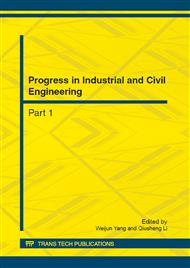p.3749
p.3754
p.3760
p.3765
p.3771
p.3776
p.3782
p.3786
p.3790
The Influence of KCl on the Performance of Oil Well Cement Slurry
Abstract:
The influences of KCl on the performance of G-Grade oil-well cement are discussed in this article. The macro performances including the rheological property, filter loss of slurry and the thickening time, strength and shrinkage of cement are tested. And the reasons why those influence could happen are explained by analyzing the microscopic structure of the cement. The results show that: KCl takes participation in hydration reaction of cement, KAlSiO3 and Ca4Al2H0.34O6.34Cl1.67 are generated in the reaction that could improve the compressive strength of the cement and reduce the shrinkage of the cement, but there is a limited added amount, less than 12% (BWOW) is the best.
Info:
Periodical:
Pages:
3771-3775
Citation:
Online since:
October 2012
Authors:
Keywords:
Price:
Сopyright:
© 2012 Trans Tech Publications Ltd. All Rights Reserved
Share:
Citation:


